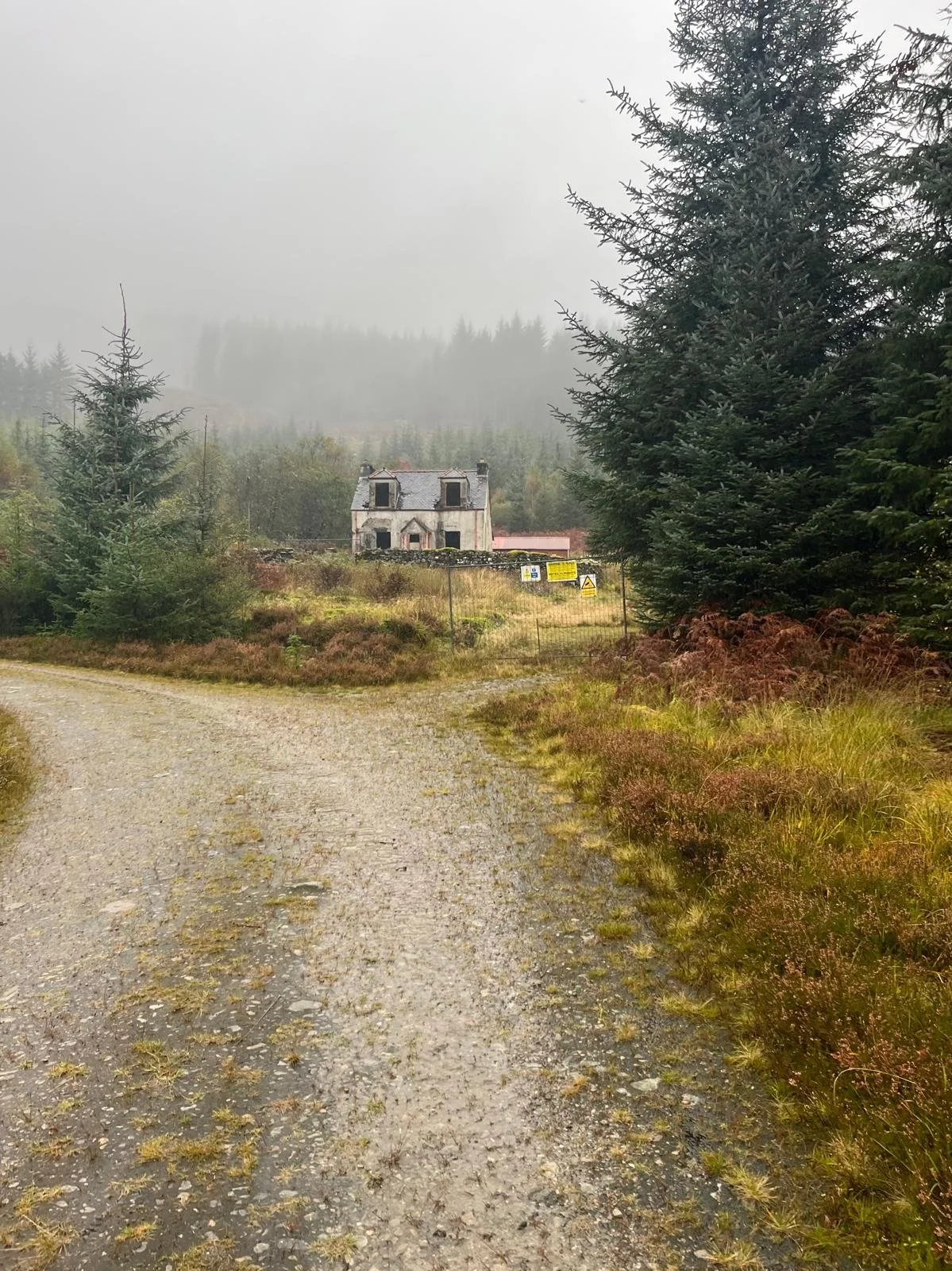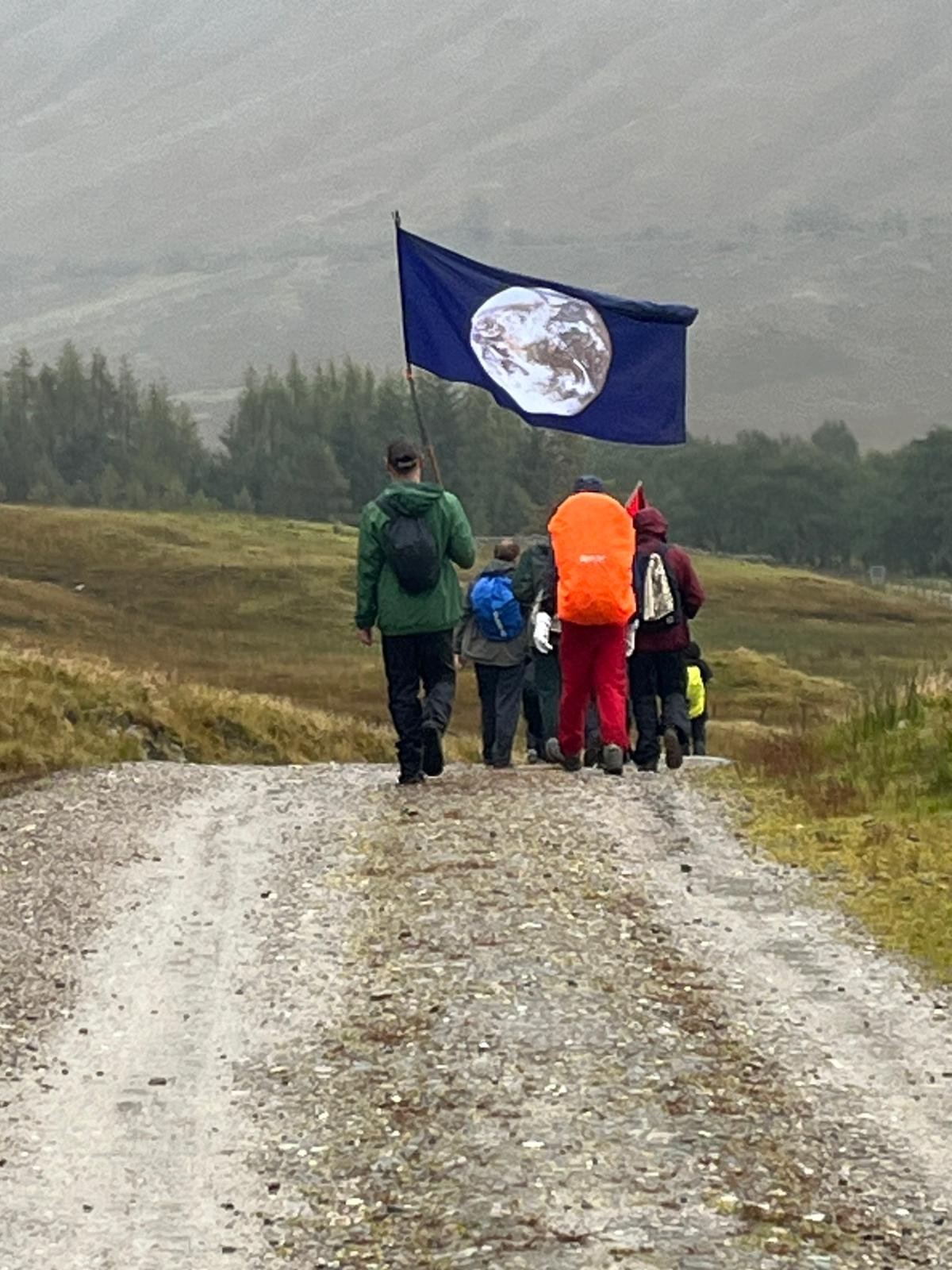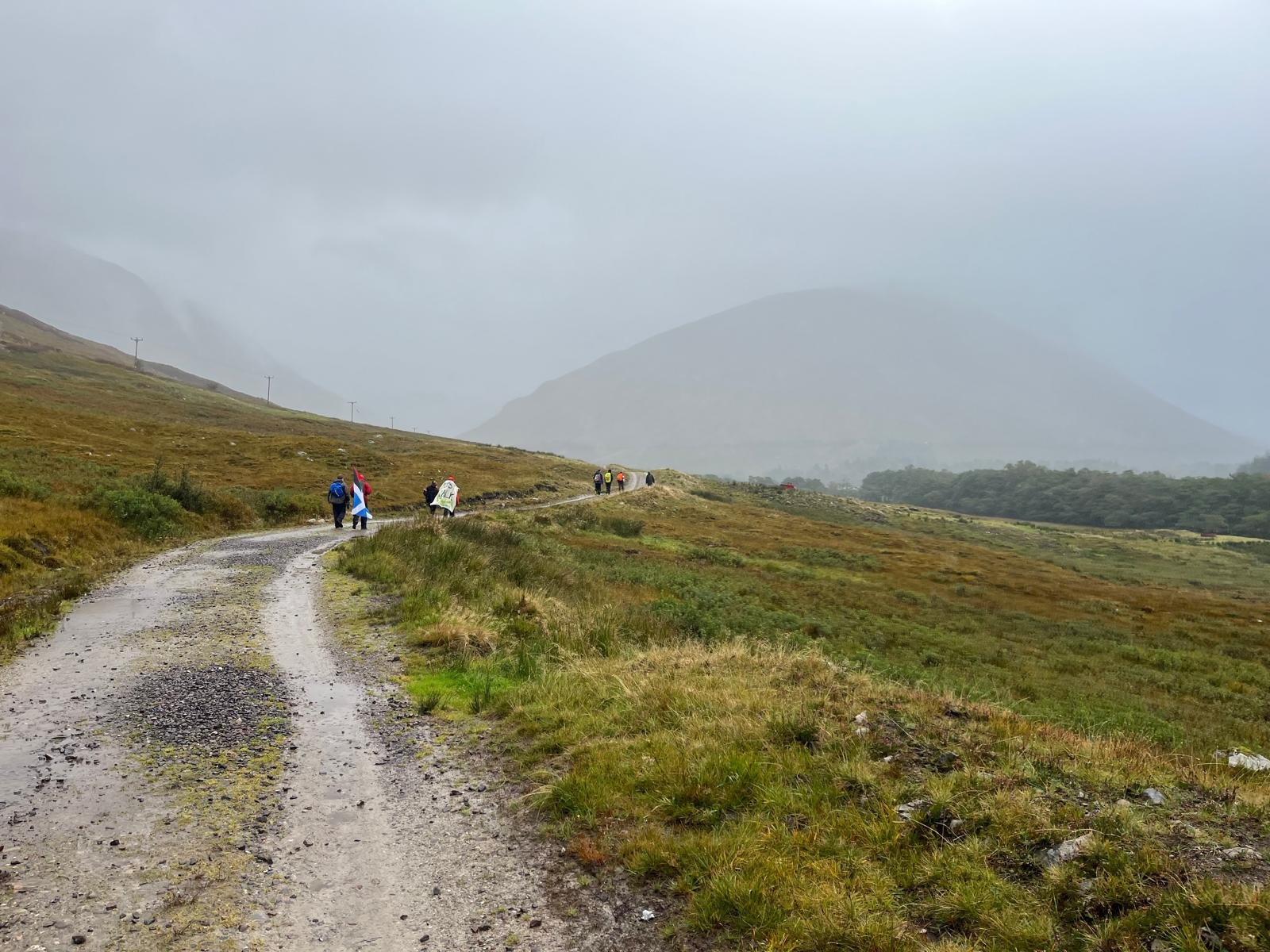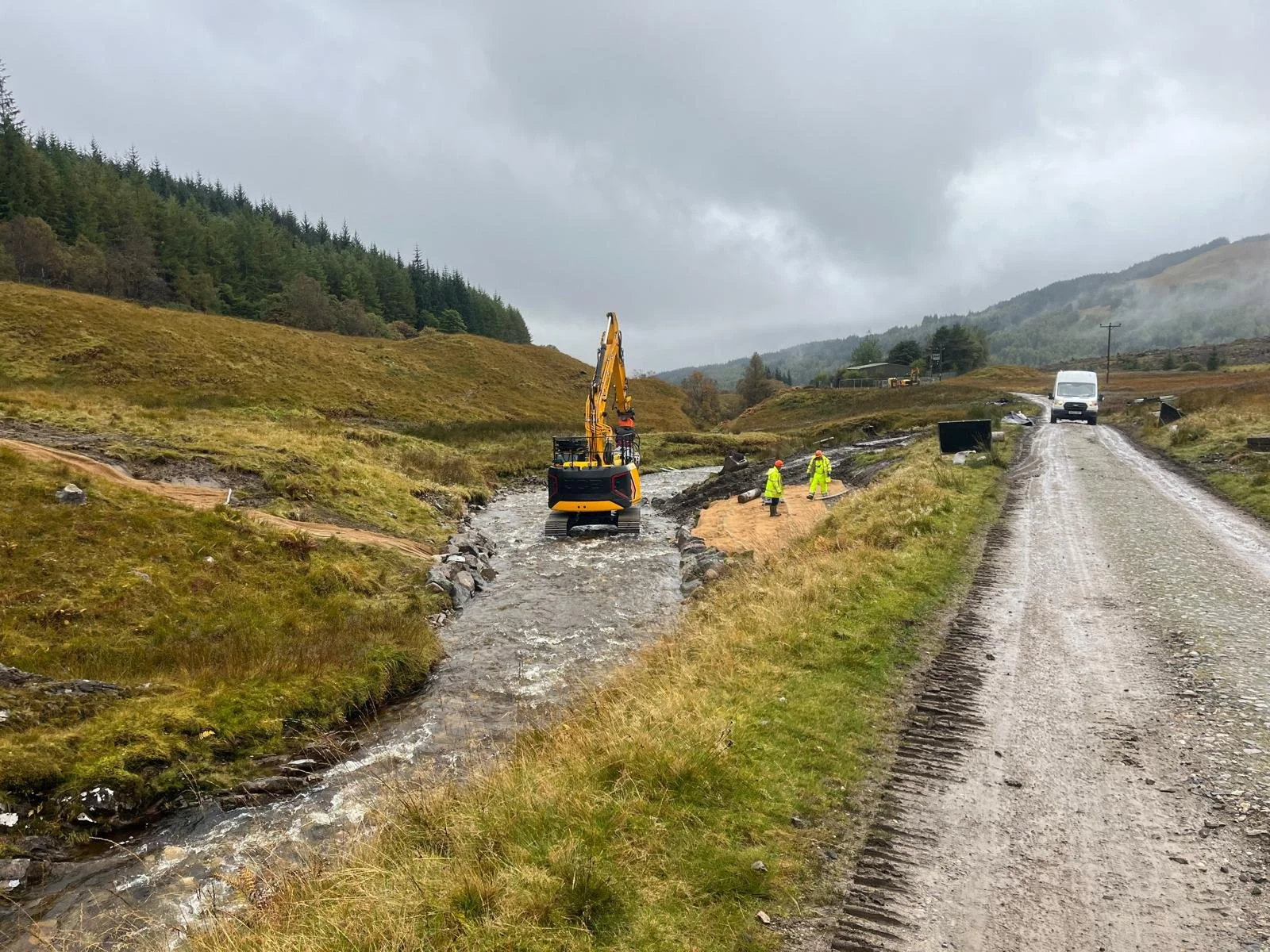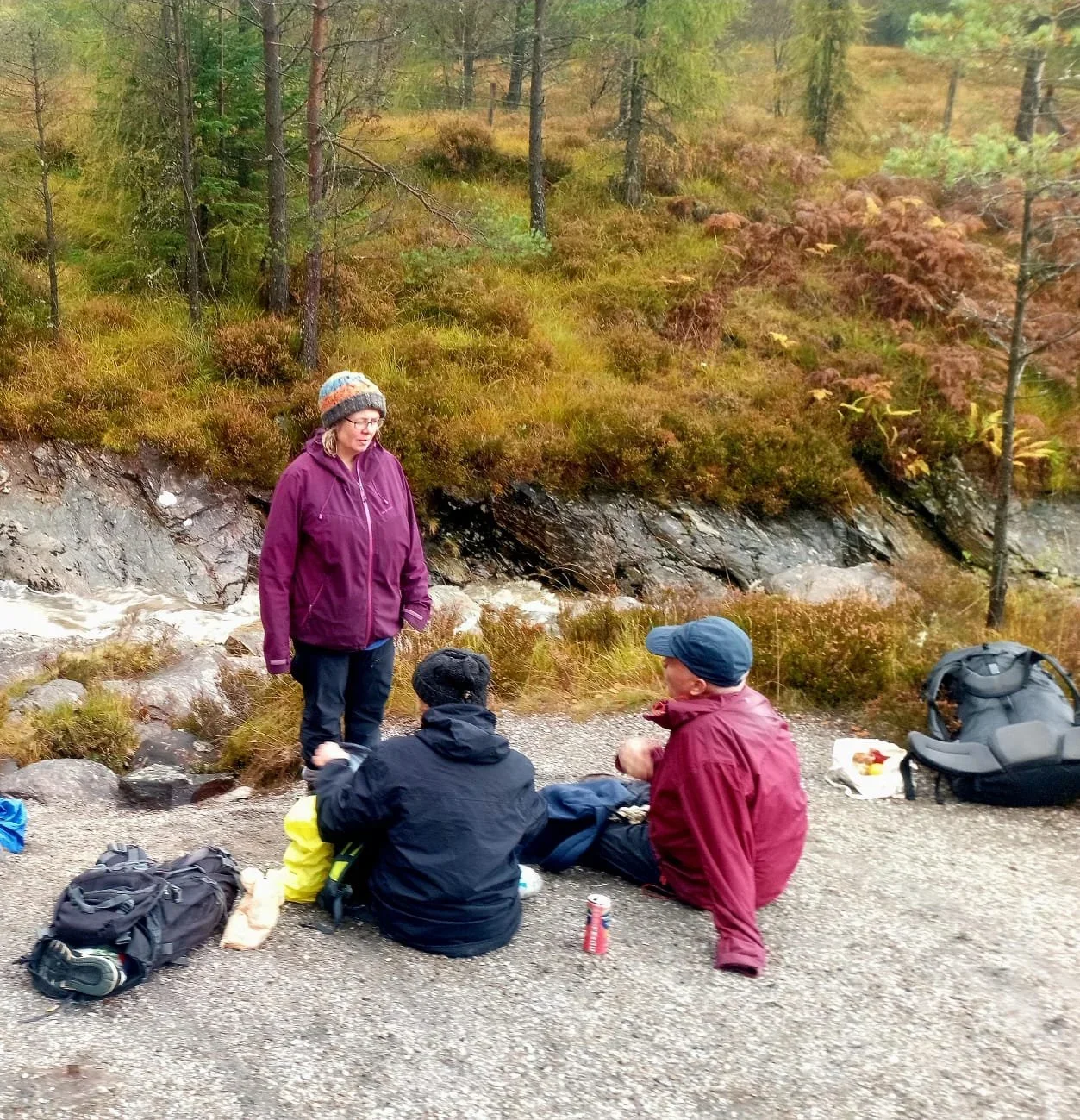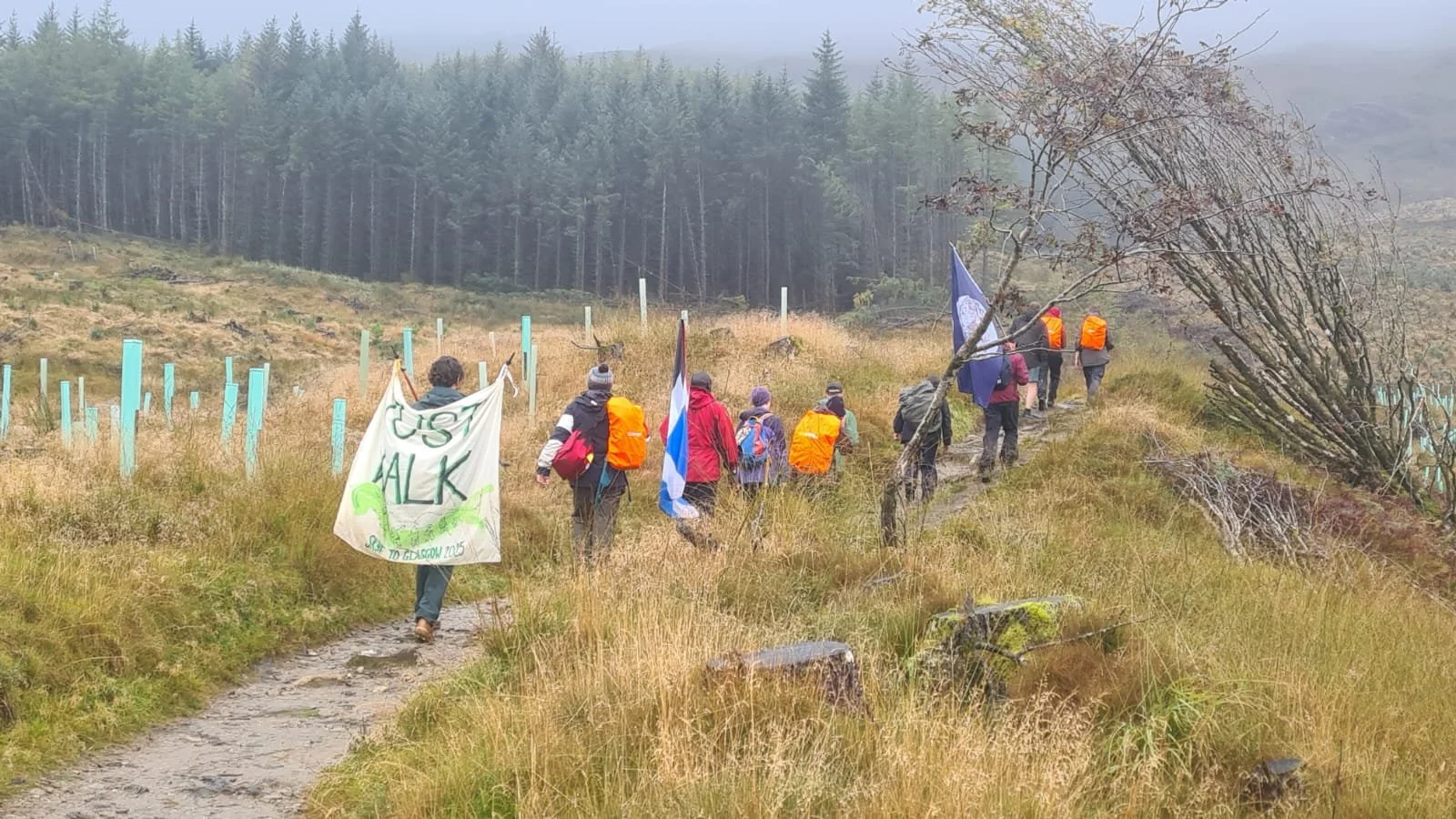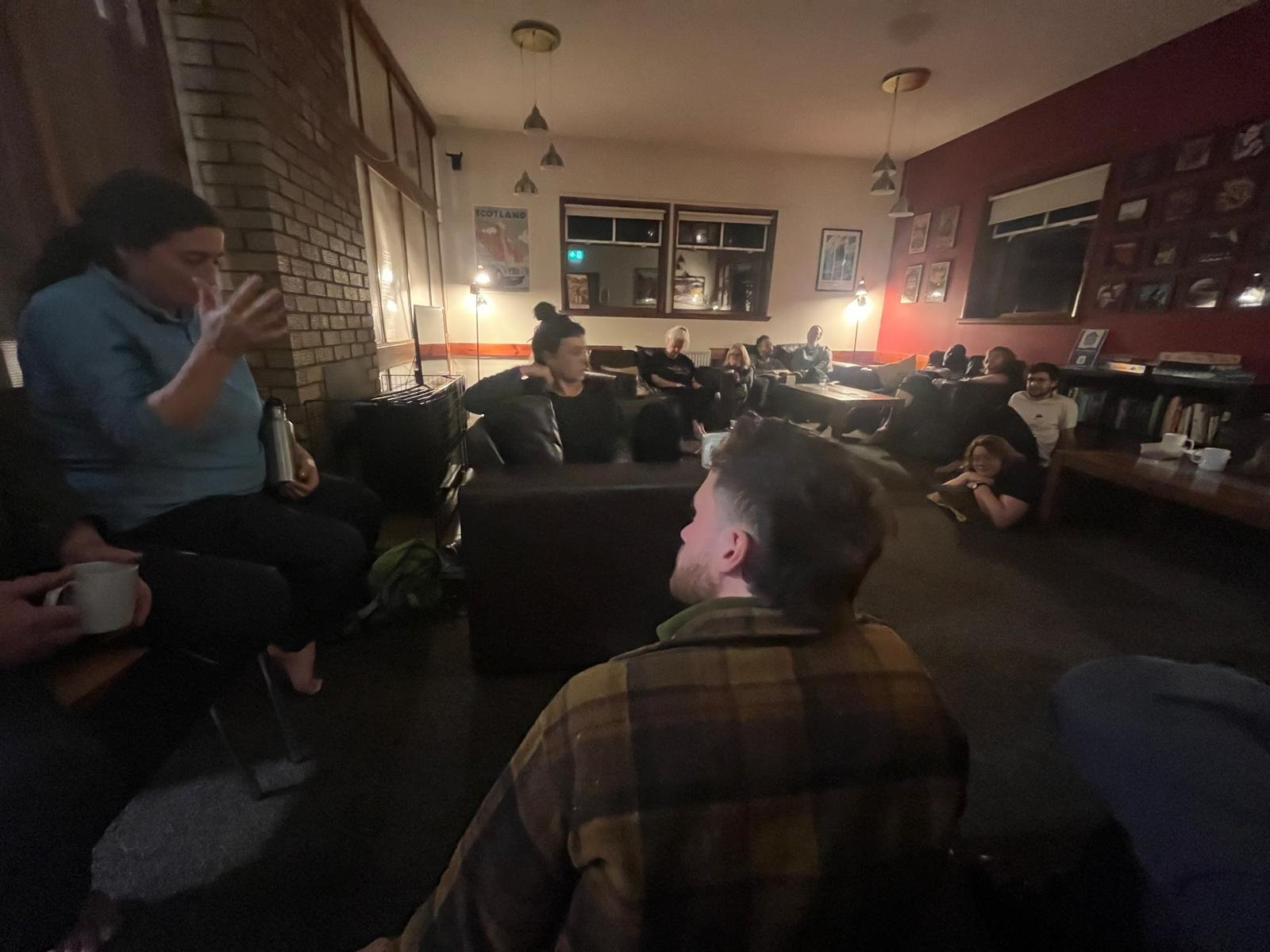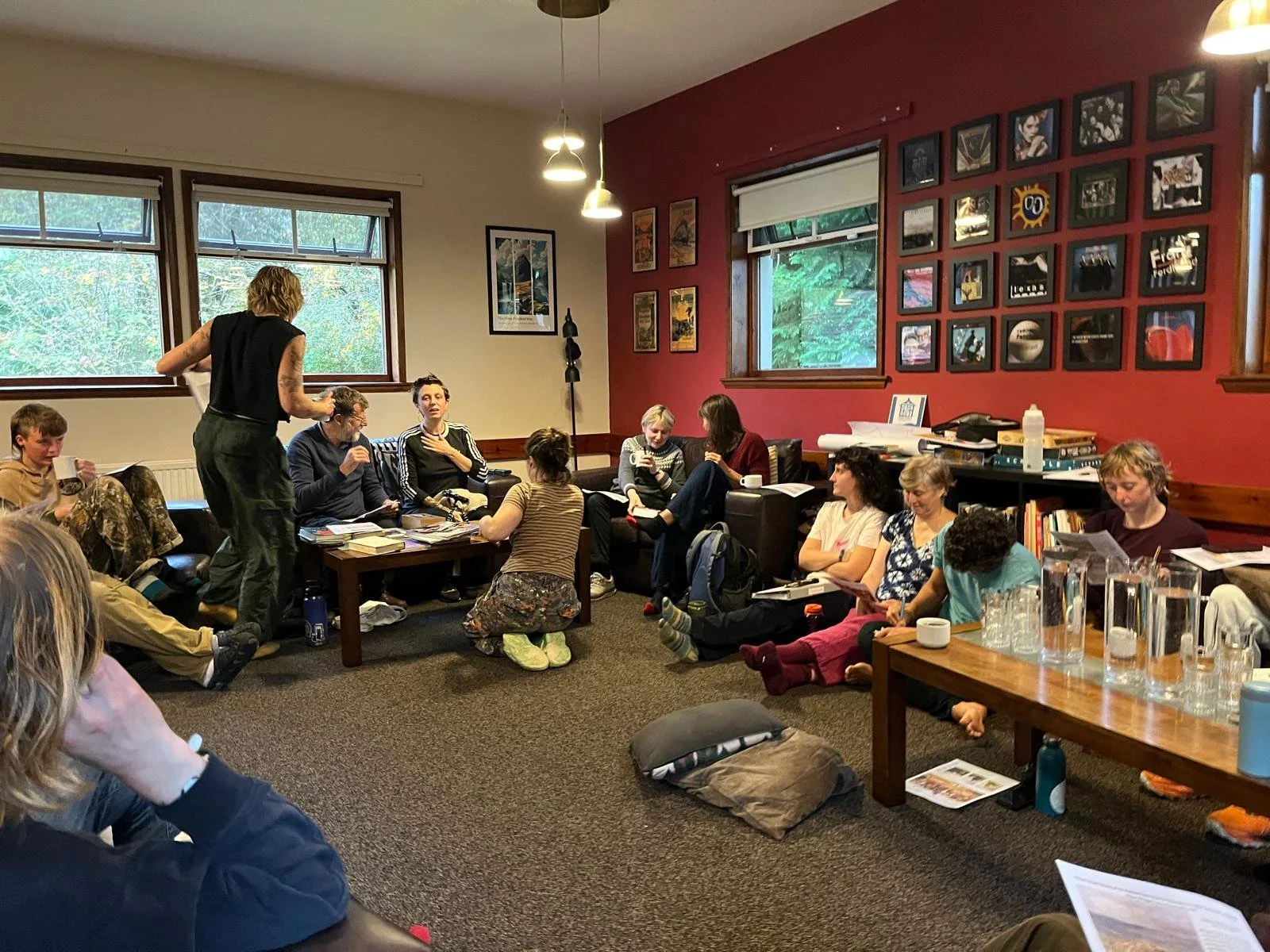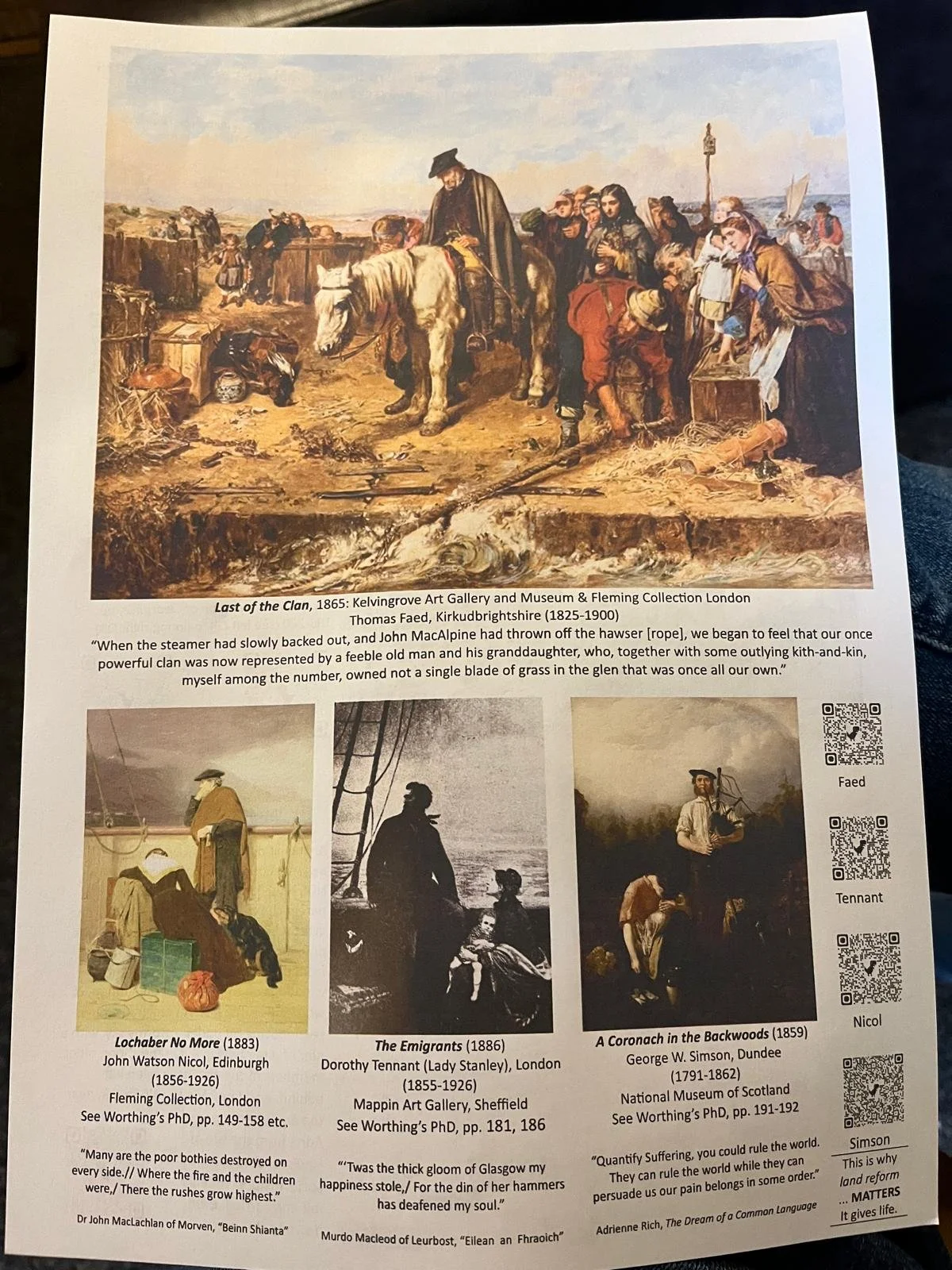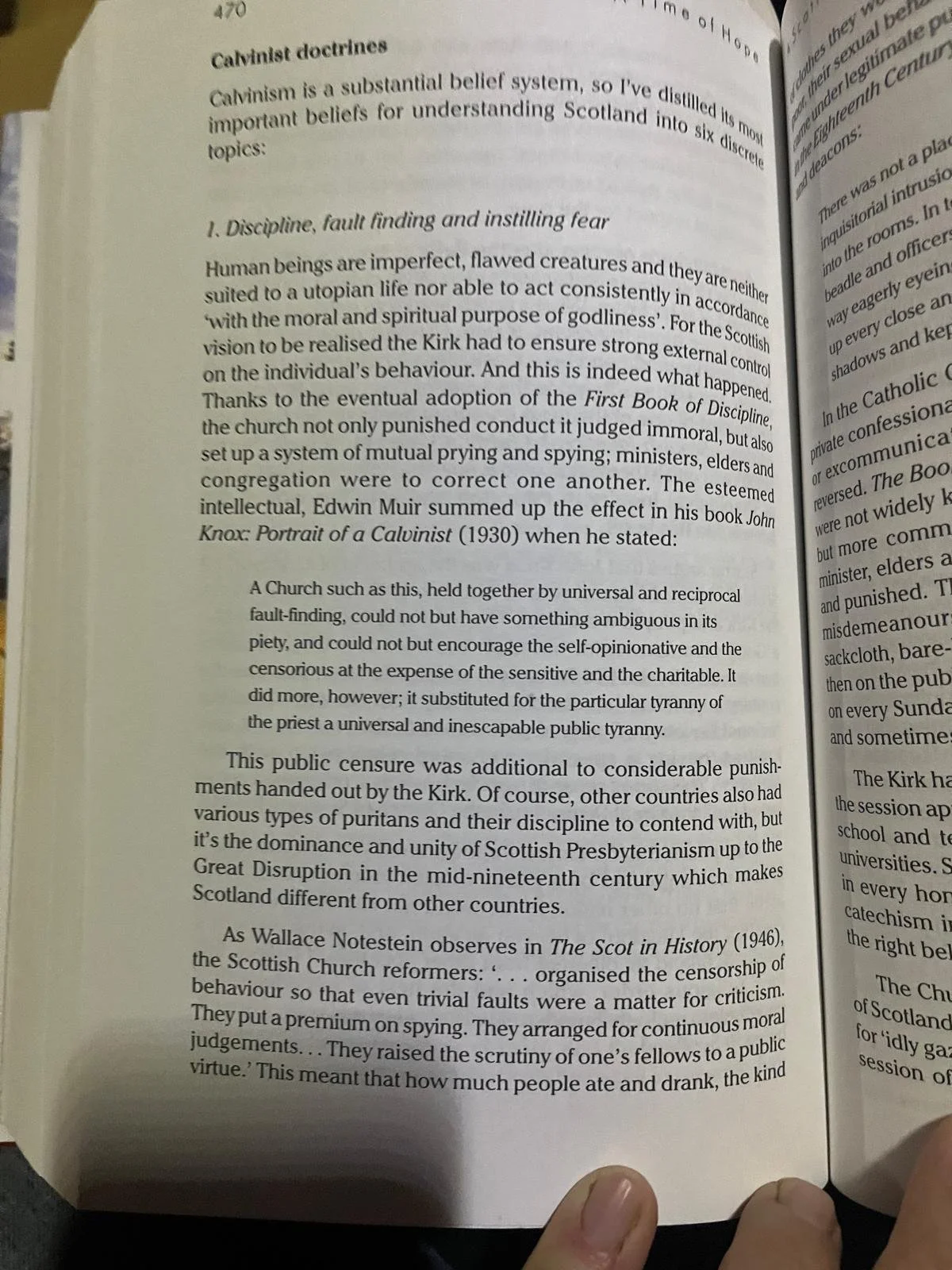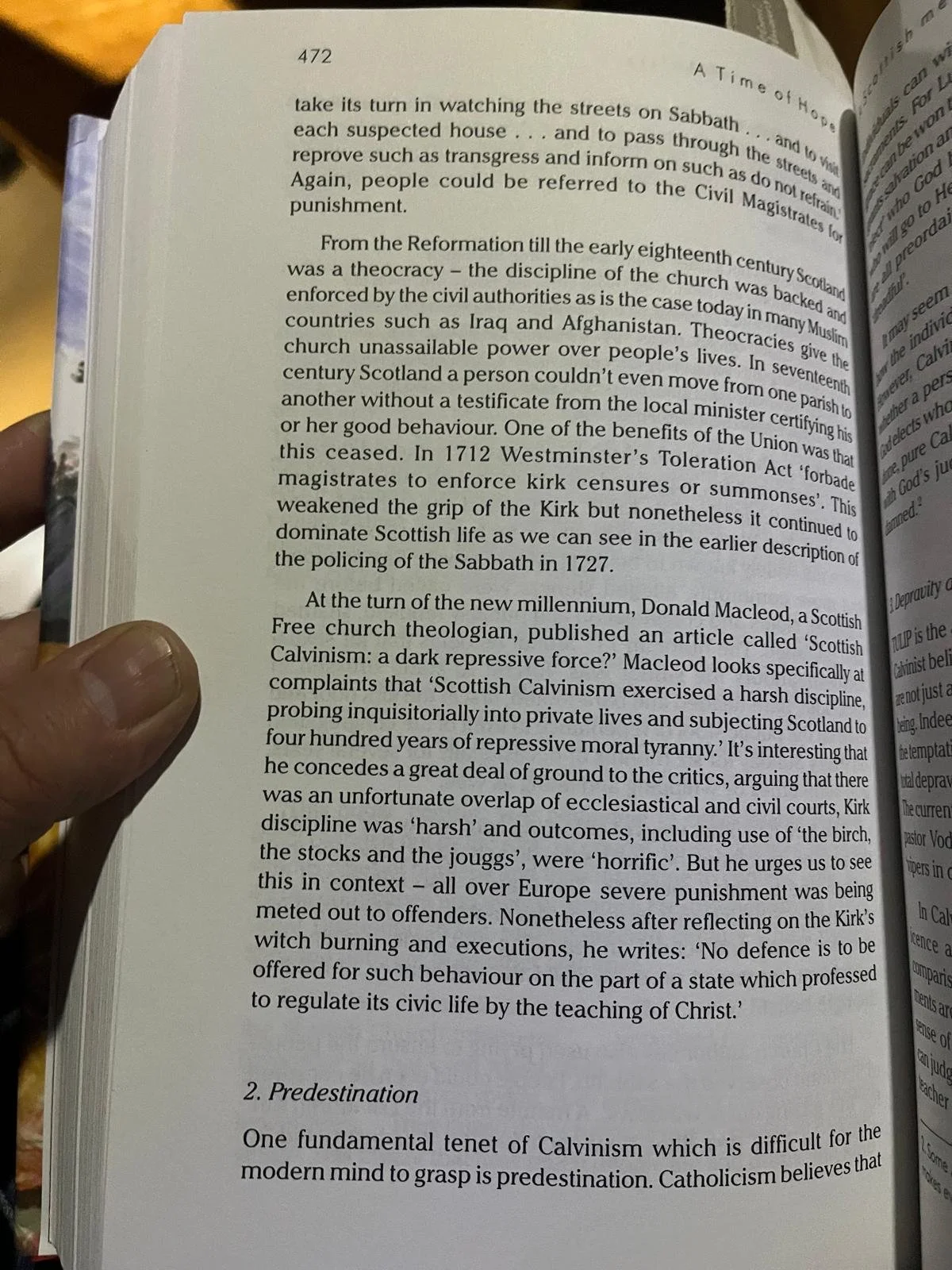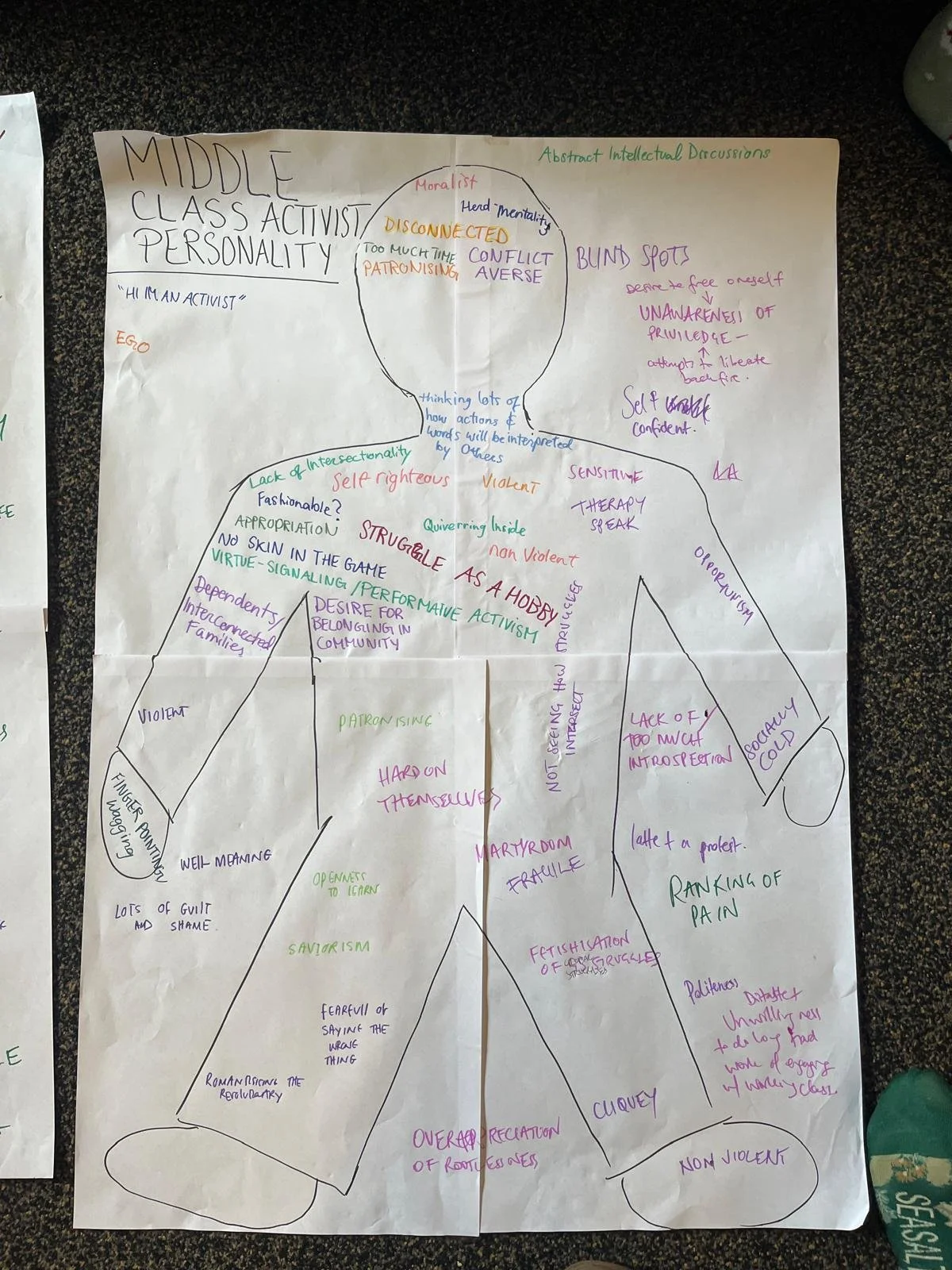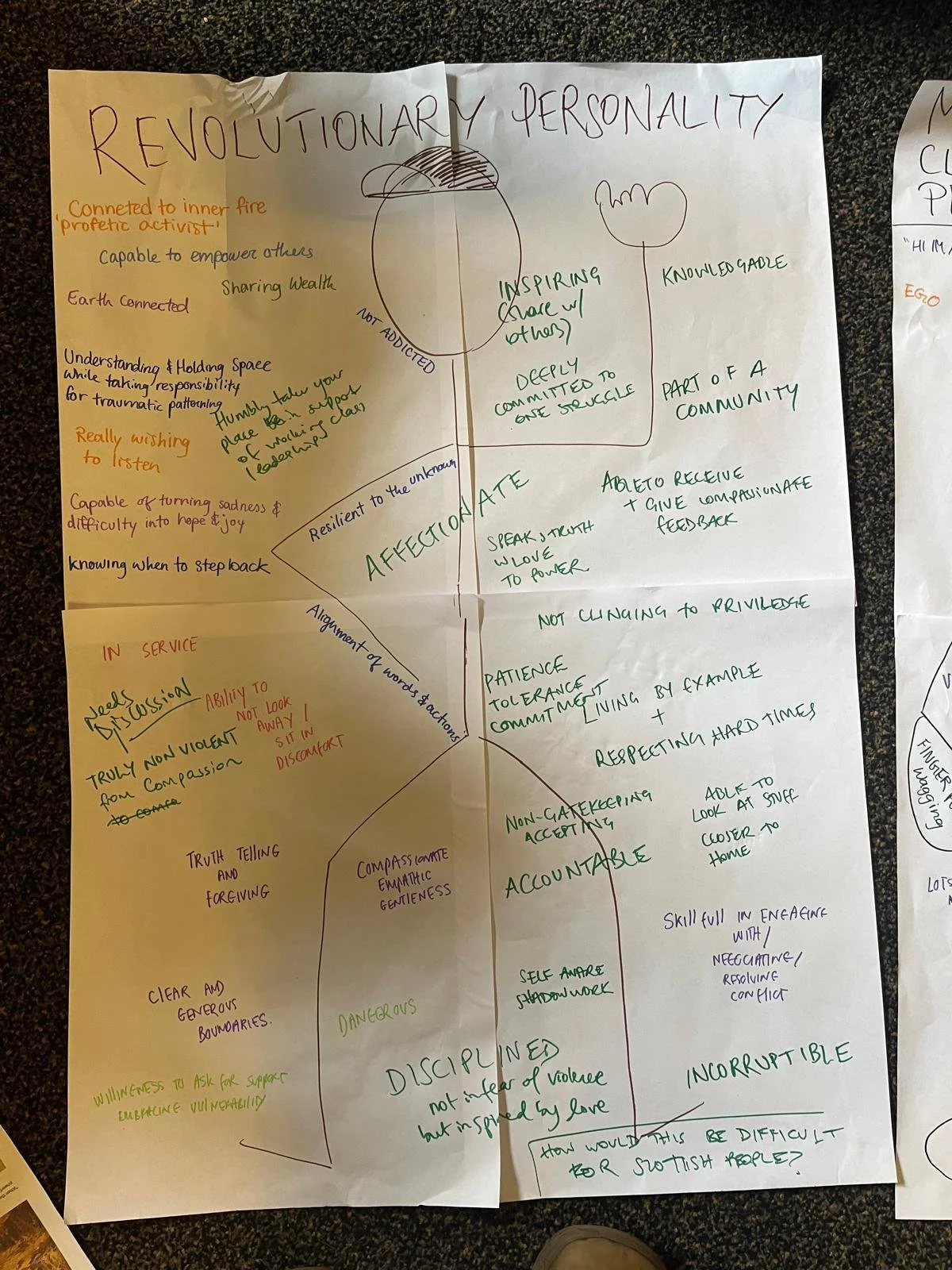to CRIANLARICH - devastatation and recoivery
Day 15 - Bridge of Orchy to Crianlarich (13 miles)
After looking at what seems to be a haunted house nearby, we pack the vans, gather to hear the route from Ben, and then leave the lodge to head north briefly to the bridge, then - crossing the bridge, the road and the railway track - we start heading south towards Tyndrum and Crianlarich.
Some of the route is full of moor and seems alive and well.
However, much of the land feels quite devastated. The monoculture of industrial forestry (Thatcher’s tax breaks for the rich) cut the land into rectangular blocks of trees marching in line, and into cleared grey areas of brutal clearfelling.
I message Andy Wightrman (of ‘Who owns Scotland?’) to ask him who owns the Auch Estate we are passing through. He replies: “Profound UK Holdings Ltd controlled by Mr Ming Wai Lau”,
As we approach the pass before descending rapidly to the tourism-serving settlement at Tyndrum, the busy road, rushing river and single track railway squash in together, and there are diggers digging out the river from our path that has become a road for Scottish Water’s concreting work.
The day before we’d spoken about how capitalism lives inside us and how hard it is to. Kick outs additions. Arriving at Tyndrum, Ben tries to keep us focused on moving through lunch spot beyond it, but many of us are quickly caught in the convenience of first toilets, then coffee, then whatever vas be bought to sooth the inner capitalist who seems to thrive on scarcity.
Just beyond Tyndrum we stop for sandwiches in a seeming-gravel pit by the river, and are told it’s a re-opened gold mine, and we’re welcome to search but any gold we found belongs to the crown. Weird.
By the end of the day some of us feel way more tired than we are used to, and wonder whether that is because of how much time we have spent not only walking, but collectively reflecting on the land justice questions we have each dreamt up, and then discussed with each other as we walk.
There are questions about global land justice and about land justice in the context of climate change and migration, with Kipchumba pointing out that so much forced migration is the result of people bekin gforced from their lands elsewhere.
There is Skye’s answer to the question of “What is land justice?”, which is that it means justice for the land, including for humans as part of the land. A wonderful de-centring of humans that is also a reintegration of us into the ecosystem that we are made from and return to.
There is my long question that Poppy had the misadventure to pick up, which is something like: “How do we stop giving away our power to this domination system and instead reclaim it?” I have a suggestion on that which involves giving up on our addiction to giving our power away to politicians who we hope may make thing better. It is an addiction that alllows us to abdicate our responsibility, and then blame politicians (who are powerlessly caught in reproducing the system) as if itis ther fault rather than our responsibility.
We are on the West Highland Way and come across walkers coming the other way, walking from Milngavie (pronounced: ‘Muhl-gai’) near Glasgow to Fort William.
They are all positive about the purpose of our walk, until Poppy, Kipchumba and I encounter a landowner between Tyndrum and Crianlarich. He is a much older man standing beside his 4 by 4 vehicle up in the hills.
I tell him: “We are walking for land justice, for the land to come back to the people”, and then add - for no apparent reason add (I’ve never added this before) “You might disagree”.
He replies: “I do disagree”.
Thinking he might be someone with a small plot of land, I respond: “We’re talking about landowners who own 50,000 acres and who stop communities from developing what they need.”
He replies quickly: “I only own 4,000 acres”
I say: “I’m sure you support your community, and enable folk to develop as they need”,
I have adopted a welcoming stance. One that suggests: “We’re going to win. You’re going to give up your land and come over to the side you need to be on”. It’s the stance of one privileged person to another. I’m not proud of it, but it is unsettling for the privileged to meet it, and it is maybe ok as long as it also unsettles me.
We shake hands, at my instigation, and move on.
Afterwards Poppy points out that he is holding an extraordinary staff-like walking stick, white handled and carved-looking.
Kat Jones’ photo
We wend our way through more devastated forestry landscape before criss-crossing the busy road as we descend into Crianlarich, curl under the railway station, and arrive at the Youth Hostel to rest (or so we think) for two nights.
While we were walking, the day’s support gang of Gabs, Wapat, David and Eva have been gathering supermarket trolly loads of supplies to feed us all at our two night stop over at Crianlarich YHA.
In the evening, there are four talks:
Wapat talks about his community doing the work of ensuring the resources of the land are there for future generations, and that - in Bella Coola - the opposite of poverty isn’t wealth, it is dignity and unity.
Kipchumba talks about the situation of his people in Kenya, and how the Sengwer experience the state agencies returning every year or two to burn his peoples’ homes and evict them from their ancestral lands.
from David and then Annie on Glasgow, with David’s talk drawing on his radical Glasgow tours, telling of Mary Barbour, and how the Irish land league inspired the Scottish land league; and then Annie on how the Irish famine was the Empire’s deliberate starving to death of a million people (who had to walk to food relief, and were made to work while already starving), as well as the fact that this forced 2 million to emigrate, including on the ‘coffin ships’ to America; and
from Norah and Bob on the struggle that led to the successful community buy out on Eigg that restored the island to community ownership, and has led to a vibrant place that knows how to party, has its own independent renewable electricty grid and independent brewery and is a place youth return to.
Day 16 - a day of words spoken - what was meant, what was heard?
A couple of folk are about to feed back from one of the six afternoon groups. They are sitting on the floor in the middle of the room,. and preparing to go through their extensive notes. Eva says:
“Put away your notes, and just tell us anything that really stood out for you personally. If you miss anything crucial then someone else from the group can add that after, but just tell us what mattered to you. Remember from the heart not the head”
So what do I remember - without looking at my notes - from this intense day? What are the feelings?
The morning is mostly listening to two talks - one from Alastair MacIntosh, the other from Carol Craig. The morning ends with an intense process of collectively fleshing out two stereotypes (the ‘middle class activist personality’ and the ‘revolutionary personality’) under guidance from em. In the afternoon folk propose what they want to discuss, and Eva helps us break into 6 groups, to then feed back to the whole group.
It is not so much the talks themselves - though they are powerful - it is more the talk in the sidelines, the small groups, the breaks, and over tea.
Those liminal spaces are well informed by Alastair’s powerful recounting of the Clearances, including through booming poetry that sounds like prophecy. It is great to hear Alastair stretch to encompass his diversity of ancestors - his being born in Doncaster of an English mother, his father from Edinburgh, and his growing up on Lewis. For me, there is something crucial in recognising the equal impact of all our ancestors, and that each person alive has as many ancestors as any other person, so we can see what we are doing when we emphasise some and not others.
Three fragments from Alastair’s talk:
The importance of the clearances of the Highlands was that this was so recent.
An old friend of mine would have his hand tied to the desk for speaking Gaelic. People of my generation had the belt for speaking Gaelic.
Are we going to wallow in our trauma or are we going to get our act together in us and outwardly? How can we do that when we come from all these cultural backgrounds to be here in this room?
The side conversations are also informed by Carol’s powerful historical analysis of the role of Calvinism in developing a Scottish sense of exceptionalism in which we together strove to create heaven on earth, but through a process where we were policing each other’s thoughts and actions, based on a deeply inculcated sense of being worthless and quite possibly damned.
No wonder Carol seemed - in a side chat after her talk - to be concerned that the push for independence might be more about fantasising about heaven on earth rather about seeking to take back responsibility. Quite possibly that was what was true for some folk, just as others may have had a fantasy of ‘benevolent Britain’.
Carol traced the notion that we are uniquely worthless and incapable back to Calvinism, but might it also reassert itself in the notion that we are better off not running our own affairs? If so, is this different or similar to landowners oft asserted claim that if the community runs its own affairs then everyone will be at each others’ throats? Clearly the latter is neither true nor not true. It is up to us.
In her talk, Carol mentioned how the Act of Union brought a degree of religious toleration. Presumably a correction to the notion that Scotland has received no benefits from the Union with England, rather than reflecting the notion that we need to be ruled over by others. In her superb talk about Scotland what seemed to be missing was a focus on the traumatising forces of colonialism.
Her talk helped us recognise the way our cultural choices contribute to our collective trauma (as outlined in her brilliant book - ‘A Time Of Hope’ - especially pages 467 to 479). But do we also need to recognise the far larger forces appropriating land and culture, if we are not to end up blaming ourselves for our patterns rather than extricating ourselves from them?
Fragments from Carol’s talk:
I think there’s a danger of Scottish exceptionalism when what was happening was happening across the world.
I was just so aware of the lack of confidence in Scotland. I was horrified by the negative analysis of Scotland, but the lack of confidence isn’t politics. It’s the pervasive notion of worthlessness.
‘Spirit level’ - the more unequal a society the worst for all. As humans we have the need to be respected. If not we will kick out at those lower than us. But it’s worse in Scotland. Why?
“The tears that made the Clyde”. The extent of lowland clearances - outpouring of people from lower areas at great speed - into Glasgow. Landowners had more power here than in any other country in Europe. They could end tenancies and evict people. This was then added to by the highland clearances and what happened in Ireland. It’s the sheer scale of what was happening in Glasgow.
Individuals have a need to make choices while belonging to a social group and making a social contribution. Highland culture would have been very good at this - you’re recognised and belong.
In Glasgow you got dislocation on a grand scale. People get overwhelmed by the poverty of the spirit, and you get waves of addiction - drugs, alcohol, shopping, sex, internet - to fill the void.
The history of Glasgow includes contempt for the poor - worms, vermin, lowest of the low. Calvinism: terrible living conditions were seen as God’s judgement.
Scotland is an outlier in its corporal punishment of children. Poland outlawed it in 1780. English state schools did not hit children anything like Scottish state schools. We were belting 5 year old girls for making a mistake. England was belting teenage boys for misbehaving.
People would say it’s the Highland clearances or the Union that did it. Looking for a national story. Now everyone looks at politics - e.g. Scotland’s relationship with England rather than looking at family culture - there’s an abusive family culture. People’s experience of verbal abuse: 17% in England, 20% in Wales, 40% in Scotland
Trauma is one of the most overused words - e.g. to mean stress (I was caught in traffic) so it starts to not mean anything. It’s when your life or the life of loved ones are at stake. People now get browny points for being victims. What really matters is whether you can experience agency
It wasn’t the English doing it to us. It was Scottish landowners. And the lowlanders had contempt for Highlanders until 1890s. The history of other countries (Spain, Nazi invasion, Balkans) is much more recently awful yet they have much better health. Scotland was treated much better than Wales and Ireland.
1560 reformation - we became a unified religious Calvinist country attempting to build the kingdom of heaven and earth. Big emphasis on fault finding and punishment. We were a theocracy until the Act of Union. England insisted on some religious freedom (Toleration Act of 1704).
Predestination - preordained who is elect and who is dammed - then if successful it is a sign you may be in the elect. So if you’re poor it’s a sign you’re dammed. Patriarchy and the witches. Scotland killed twice as many witches as England. Pleasure, sex and affection were not allowed - this was terrible for children and for adult health. But that has changed a lot.
Before these two talks, Em had welcomed new folk at the start of the morning, including Alastair, Verene (Alastair’s partner) and Carol. Em had then introduced the morning by saying:
“If we get the land back, what is the culture we need to be with that? In the Kurdish women’s movement there is a lot of internal work. I feel strongly we can’t just take from other revolutionary struggles, for example here we have a lot of brittleness around feedback. Trauma decontextualised in a person looks like personality, in a people looks like culture. They look unchangeable but actually are understandable and changeable”.
After the two talks, Em takes us through an exercise where we call out the characteristics of, first, what em calls the ‘middle class activist personality’ and then the ‘revolutionary personality’. These are written on two large sheets:
Manu asks if these are really the contrast between being an ineffective activist and being an effective activist? Does the move from activist to revolutionary parallel the move from pushing for land reform to engaging in the struggle for land justice?
Em reads out the characteristics we’ve given to the ‘revolutionary personality’:
“Resilient, alignment of words and action, part of a community, dangerous, not addicted, living by example, telling truth but forgiving, respecting peoples experience (but being aware that people have been brutalised), compassionate, empathic and gentleness, able to give and receive critical and compassionate feedback, connecting to the inner level (source of inspiration within us - activism informed by the artistic surge), knowledgeable, patience to not look away (eg encampment outside Parliament, students moved to George Sq), ability to sit in discomfort, able to empowered others, clear boundaries, earth connected, sharing wealth and not clinging to privilege, Jesus (compassionate, shadow work, etc), humbly take your place in service of working class, owning your shadow, being deeply committed not a finger in every struggle, speak truth to power with love, understanding, processing and making space for the traumatic patterning we all hold, being accountable, being in service and discipline (having the discipline to follow, inspired by love), being deeply non-violent and able to temper violence (not holding violence with resentment, but acting out of love), vulnerability and openness, wishing to deeply listen, commitment and tolerance, turning sadness and difficulty into joy and happiness, non-gatekeeping, accepting what comes, inspiring, affectionate”
Em then asks us to find and work on a part of ourselves:
“We all have different parts of ourselves, guarding wounded parts of ourselves. We are not the harmful behaviours, they are things we’ve learnt. Find a part of yourself on the work in progress sheet [the ‘middle class activist’ sheet] and go as deep as you like. Give it a name: The cynic, the victim, the workaholic. Flesh it out - write it, draw it, a small play. How does it move? What does it like to do, how does it behave on its own/ with other people?”
After the side conversation outlined above with Carol, I work with Flora and go into embodying a part of myself, and afterward recount the experience:
“My handbrake is on, because of fear of causing harm, or others causing harm. I then took the handbrake off and felt in flow, no longer Calvinist judging of self/ other, but keeping aware of what’s happening in the interaction/ open eyed. I use humour a lot to cope, but could just be more straightforward. Thanks for saving me a lot on therapy.”
Someone responds that they have fear and shame of the hand brake. Skye says:
“I want everyone to get from this to this with care not shame, because if you get to this [‘revolutionary personality’] with shame you’re right back here [‘middle class activist’]”.
Manu responds:
“I was a bit afraid of this exercise. I’m afraid of losing privilege (my small troubles feel so big inside me). What’s the risk of going for what I believe in? if there a change it needs to be more than 20 people. How can I digest these ideas in a way that can bring them to other people.”
Annie from Govan:
“Alastair’s fire and poetry, and Carol’s understanding of Scotland, Glasgow, Govan. Will change mean some have to give up privilege? A friend used to describe me as aspiring to be working class (my father was a teacher). Where I live, people who are in their 60s are ill from their 50s, and drink and drugs. Middle class has always been workers with better pay, better conditions, better manners. I’d rather be the organiser. Organising is hard, it’s like pulling teeth. We’ve a page called “I come from Govan” and it’s hideously racist. People who are left out are easy prey.”
David:
“We’ll see fascist members of Parliament in Scotland in 2026. How do you counter racism (there was never a problem with folk coming from Ukraine). So we need to not shut people down and be cliquey, and shaming. We have to work with people we find despicable, because otherwise it’s a shoe in for fascism.
Lizzie:
“People aren’t just racist. There is a huge role played by the mass media. There’s huge prejudice against Rumanians, but Ukraine was pushed by the press. The narrative is about othering.”
In the afternoon there is a process of people proposing what they want to discuss, and then Eva gathers different conversations together so we end up with two rounds of 3 different conversations in each round, with people able tome between the three.
The first round includes
Processing the morning
What is causing land injustice/ what do we do about it?
Scottish/ international/ belly of the beast
and the second round:
What can be our impact/ demands?
Forest voices
How do we take care of ourselves and each other while living in two worlds?
Fragments from the ‘What’s the impact/ demands?’ discussion:
Moving from land reform to land justice. Reform perpetuates status quo with small changes. Justice ends the control exerted by the powerful
Connect land justice to other issues that deeply matter to people [housing, food, youth engagement]
Start from what we stand for - all in the positive - counter to the right wing
We believe that land is autonomous and cannot be owned
We need to be committed to the long term, but ready to seize immediate opportunities to reconnect people to land
How to tell a story of land justice that attracts, appeals and draws in? Tactics of occupation are stories/ spectacles. if we’re here to take back the land how are we going to say it will be used in a way that elicits desire. How does this look sexy? What’s the imaginary? What’s the medium?
Theatre would bring people in - make things fun: drama, poetry, art
The Walk is long form working together, with people at their most vulnerable: eating, sleeping and shitting
The most impactful work of art is one where the audience is actively involved
We’re taking the land back from the bastards who stole it from us, to share fairly
Land justice overturns our current system of inequality
Indigenous knowledge landing in a Calvinist culture can be used to fuel self hatred and criticism of others
Land injustice means stress, extraction, destruction
Land justice means good company, good faith: sharing food, company, homes, music, peace, enjoyment, love & pleasure
Liberating the land is liberating ourselves
Free our minds and the land will follow
In the evening we discuss the huge storm that is coming. We’re going to have to abandon the place we planned to camp in tomorrow night because the storm is a strong westerly and the place was in a pass on the east side of Loch Lomond where the wind will be funnelled through.
Eva has to catch the last train to Edinburgh so she can head down the next morning to her dad’s down south. He is 87 and critically ill in hospital. Her presence and facilitation will be sorely missed.
LOCH LOMOND

